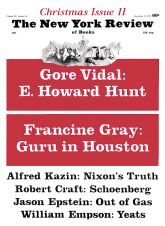In response to:
Stravinsky: Problems for Biographers from the August 9, 1973 issue
To the Editors:
Our attention has been drawn to [“Stravinsky: Problems for Biographers”] written by Robert Craft which appeared in The New York Review of August 9. It is we who have the rights to publish the Stravinsky Archives and the article completely misrepresents our position and the circumstances under which we acquired the rights. The document granting us the Archive rights was prepared at Igor Stravinsky’s instigation as he was anxious that the rights be given to us, the publishers of his music, with whom he had a very good relationship for many years, both professionally and socially.
Mr. Craft describes the document as “piratical” and we resent the implication. Mr. Craft is well aware that the terms of the document were fully discussed with Stravinsky before the composer signed it, and that the document was signed by the composer and Mr. Craft in each other’s presence. As a matter of fact, Mr. Craft undertook in the document to edit and prepare the material for publication. In furtherance of that obligation, Mr. Craft supervised the photographic copying of the material in the US.
Robert Craft asks whether anyone has a moral right to use Stravinsky’s own material for a biography “he would not have wanted.” The rights which we own are to publish in Archive form, personal documents, photographs and the like, in the composer’s possession, and not a biography.
We feel sure that your readers, concerned as they will be for the truth, will be interested in the above observations.
David S. Adams
Managing Director
Boosey & Hawkes
Robert Craft replies:
Mr. Adams writes as carelessly as he reads. The only true “observation” in his letter is unintentional: Stravinsky was indeed “anxious” about giving the rights to publish his Archives to Boosey and Hawkes.
Mr. Adams says: “The document granting us the Archive rights was prepared at Igor Stravinsky’s instigation.” This is false not only in itself but also as a picture of the composer, who would have been the very last to “instigate” any such thing. If Stravinsky had wanted his Archives published. he would have said so forthrightly. As for my “misrepresentation” of Boosey and Hawkes, Mr. Adams will have to be specific. Meanwhile, let me say that the conclusions drawn in my NYR article are based on Stravinsky’s correspondence not only with but also about the publishers, as well as on his unrecorded but often repeated comments.
Mr. Adams disingenuously refers to “the document.” In fact there are two, from November, 1967, and October, 1969. The microfilming was carried out after the first, a letter of agreement drafted and sent by Boosey and Hawkes. This omits any reference to me, mentioning only Pierre Suvchinsky as editor. Suvchinsky refused to sign it, however, until my name was included, which is proof in itself that Stravinsky did not “instigate” the “document.” The letter was most definitely not “signed by the composer and Mr. Craft in each other’s presence.” (But how would Mr. Adams know?) In actuality, Stravinsky signed it in a hospital bed, attended solely by his wife. Later, when he had regained his health (and changed his mind), it was the present writer who called the publishers’ attention to the inadequacy of the letter as a legal instrument, since it had not been properly witnessed, since Mrs. Stravinsky had not been a party to it (although under California property law she was the half-owner), and since Stravinsky’s medical chart showed that he was under some sedation at the time. Ironically, Boosey and Hawkes drafted the second agreement on my advice, but the microfilming had been completed long before then, and, as my NYR article stated, not under my supervision.
My description of “the document” as piratical—in a moral, not a legal sense, of course—is not an “implication,” as Mr. Adams says, but an accusation. It is almost unheard of for a publisher to give no advance to a world-celebrated artist for the exclusive rights to his letters and other papers. Yet Mr. Adams’s publishing company paid nothing for those rights to either Stravinsky himself or to his widow and heir. Even when the Archives were taxed as Estate property, but because of the Boosey and Hawkes agreement proved unsaleable, Mr. Adams’s company rejected Mrs. Stravinsky’s offer that it purchase them for no more than the amount of the tax, a sum that Stravinsky’s music earns for the publishers several times over every year. Still hoping to keep the body (the papers themselves) and soul (the publishing rights) of the Archives together, Mrs. Stravinsky proposed to purchase the rights herself, reimbursing the publishers, of course, for their expenses in microfilming and secretarial work. (As my NYR article explained, the only substantial investment, that of the editor’s salary, was paid not by the publishers but by Stravinsky, a matter on which Mr. Adams is conspicuously silent.) But this offer, like the first, was ignored.
A few months after Stravinsky’s death, one of Mr. Adams’s co-directors held a press conference to announce the coup. As revealed in the Manchester Guardian, a reporter asked what price had been paid for the acquisition, Stravinsky having had the reputation of being a hard bargainer. Mr. Adams’s co-director answered, evasively, that “Stravinsky was very reasonable.” The truthful answer would have been that Boosey and Hawkes paid nothing, a fact I challenge Mr. Adams to deny.
Mr. Adams’s final “observation” is remarkably illogical. When Stravinsky wrote “To Be Destroyed After My Death” on some of his personal correspondence, he very clearly intended that the injunction apply to the publication in “Archive form” (whatever that may mean) no less than in a biography.
This Issue
December 13, 1973



